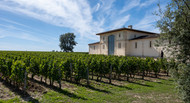The Allure of Pomerol: A Hidden Gem in France's Wine Country
Jun 17th 2024
Nestled in the heart of France’s illustrious Bordeaux region, Pomerol stands as a testament to the art of winemaking. While it may not boast the grand châteaux and extensive vineyards of its neighboring appellations like Médoc and Saint-Emilion, Pomerol offers a unique allure with its intimate, family-run estates and exceptional wines, notably its rich, velvety reds that have captivated wine enthusiasts globally.
Pomerol is the smallest of Bordeaux's major wine-producing areas, covering just over 800 hectares. This compact size contributes to its charm and exclusivity. Unlike the larger appellations, Pomerol has no formal wine ranking system, which has encouraged a focus on quality over prestige. The region's unassuming nature belies the international acclaim of its wines, characterized by deep complexity and an ability to age gracefully.
The secret to Pomerol’s success lies in its terroir. The soil is a diverse mix of gravel, clay, and sand, with the most esteemed vineyards located on the plateau where the presence of blue clay is particularly noted for producing superior quality grapes. This unique soil composition is especially favorable for growing Merlot, which dominates the vineyards of Pomerol, comprising 80% of the plantings. The remaining vineyard area is typically planted with Cabernet Franc, which adds structure and longevity to the wines.
Merlot thrives in Pomerol's cool soils, producing wines that are lush and full-bodied yet remarkably soft and approachable even in their youth. This accessibility is one of the reasons for Pomerol's popularity among both new wine lovers and seasoned connoisseurs. The best bottles offer a harmonious balance of ripe, plum and blackberry flavors, complemented by undertones of truffle, leather, and earth, wrapped in silky tannins and a subtle oak influence.
One cannot discuss Pomerol without mentioning Château Pétrus, arguably the most renowned estate in the area and a symbol of the heights Pomerol wines can achieve. Located on the eastern part of the plateau, Pétrus benefits from the ideal blue clay, which imparts a unique character to its wines. The exclusivity and exceptional quality of Pétrus have made it one of the most expensive and sought-after wines in the world, enhancing Pomerol's reputation on the global stage.
Beyond Pétrus, Pomerol is home to numerous other notable estates such as Château Lafleur, Château Le Pin, and Château La Conseillante. These producers share a common philosophy centered on meticulous vineyard management and limited production, which ensures high-quality output. This artisan approach is a hallmark of Pomerol, where winemakers often oversee every step of the viticulture and vinification processes personally.
The winemaking in Pomerol is traditional yet innovative. The use of new French oak barrels is common, lending the wines vanilla and toast aromas that complement their natural fruitiness. However, the winemakers also adapt their techniques to the unique profile of each vintage, sometimes aging their wines in barrels for longer to achieve the desired complexity and structure.
For wine collectors and enthusiasts, Pomerol offers an intriguing proposition. The wines are renowned for their ability to evolve over decades, developing more nuanced and complex flavors over time. Mature Pomerols tend to exhibit an aromatic profile with increased earthiness and notes of mushroom, dried fruits, and hints of cocoa, making them highly prized in auctions and private collections. It is not uncommon to find Pomerol wines, under correct aging/cellaring conditions, and from exceptional vintages, can age well into the 30-50 year range.
Despite its acclaim, Pomerol remains one of Bordeaux's most enigmatic regions. It does not engage in extensive marketing; its reputation has been built on the quality of its wine alone. This mystery adds to its allure, drawing visitors who are eager to discover the hidden gems of this quaint wine-producing area.
Visiting Pomerol is a unique experience. Pomerol is a quiet little town. The absence of grandiose winery tours and ostentatious tasting rooms means visitors often receive a more personal introduction to the wines and winemaking process. The vignerons of Pomerol are known for their hospitality and passion for sharing their craft, offering a more intimate and engaging experience than might be found in more commercial wine regions.

